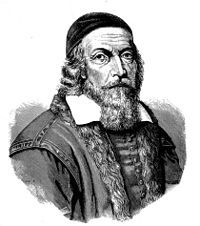John Amos Comenius
| John Amos Comenius | |
|---|---|
 |
|
| Born |
28 March 1592 Margraviate of Moravia, Crown of Bohemia |
| Died | 15 November 1670 (aged 78) Amsterdam, Dutch Republic |
| Occupation | Teacher, educator, philosopher and writer |
John Amos Comenius (Czech: Jan Amos Komenský; German: Johann Amos Comenius; Latinized: Ioannes Amos Comenius; 28 March 1592 – 15 November 1670) was a Czech philosopher, pedagogue and theologian from Margraviate of Moravia. He served as the last bishop of Unity of the Brethren and became a religious refugee and one of the earliest champions of universal education, a concept eventually set forth in his book Didactica Magna. He is considered the father of modern education. Comenius was the innovator who first introduced pictorial textbooks, written in native language instead of Latin, applied effective teaching based on the natural gradual growth from simple to more comprehensive concepts, supported lifelong learning and development of logical thinking by moving from dull memorization, presented and supported the idea of equal opportunity for impoverished children, opened doors to education for women, made instruction universal and practical. Besides his native Bohemian Crown, he lived and worked in other regions of the Holy Roman Empire, and other countries: Sweden, the Polish-Lithuanian Commonwealth, Transylvania, England, the Netherlands and Hungary.
John Amos Comenius originated from Margraviate of Moravia in the Bohemian Crown in Uherský Brod (as on his gravestone in Naarden) or Nivnice, or Komňa, all of which are located in Uherské Hradiště District of today's Czech Republic. John Comenius was the youngest child and only son of Martin Komenský (died 1602–4) and his wife Anna Chmelová. His grandfather, whose name was Jan Szeges, was of Hungarian origin. He started to use the surname Komenský after leaving Komňa to live in Uherský Brod. (He was "the man from Komňa" = Komenský.) Martin and Anna Komenský belonged to the Moravian Brethren, and Comenius later became one of the leaders of that pre-Reformation Protestant denomination. His parents and two of his four sisters died in 1604 and young John went to live with his aunt in Strážnice.
...
Wikipedia
